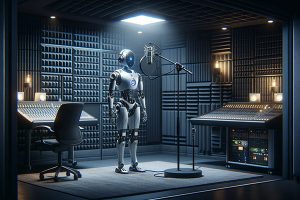Voice Actors Navigate New Terrain with AI in Video Game Development
 In the business of video games, the use of artificial intelligence to generate voice clones is gaining traction.
In the business of video games, the use of artificial intelligence to generate voice clones is gaining traction.
This emerging trend in game development, powered by AI tools, is driven by the desire to populate expansive game worlds with a wide array of characters and dialogues efficiently and cost-effectively. It also offers an alternative to traditional “vocal scratch” recordings, preliminary voice tracks used by developers to flesh out scenes and scripts.
However, the reaction from the voice acting community is divided. Concerns loom that AI could sideline human actors, save for the industry’s most celebrated names. For others, it’s a time of opportunity that’s too good to pass up.
“I hadn’t really anticipated AI voices to be my break into the industry, but, alas, I was offered paid voice work, and I was grateful for any experience I could get at the time,” said one voice actor, who grew up in Ireland and previously worked blue collar jobs to pay the bills.
The debate around AI voice clones is fraught, partly because of their association with deepfake technologies that have been used to fabricate believable but false statements from public figures. Moreover, not all actors have consented to their voices being replicated, stirring discontent among the community and gamers alike.
Despite the controversies, many large studios remain in discussion with Hollywood’s actors union, SAG-AFTRA, which also represents game performers, to navigate the ethical employment of AI voices. The union, having recently brokered a deal with Replica Studios, exemplifies a move towards consensus, offering a framework for ethical AI voice use. “Everyone says they’re doing it with ethics in mind,” remarked Replica Studios CEO Shreyas Nivas, underscoring the importance of consent and ethical practice in AI voice cloning.
“They control whether they wish to go ahead with this,” Nivas said. “It’s creating new revenue streams. We’re not replacing actors.”
Amidst this technological shift, voice actors like Sarah Elmaleh view the situation with a degree of openness, recognizing both the potential and pitfalls of AI. “There are use cases that I would consider with the right developer,” Elmaleh commented, signaling a nuanced stance towards AI-generated voices in gaming.
As the industry grapples with these advancements, the dialogue between technology and tradition continues, shaping the future of voice acting in video games.













